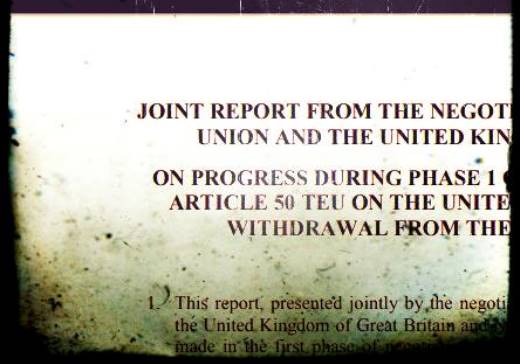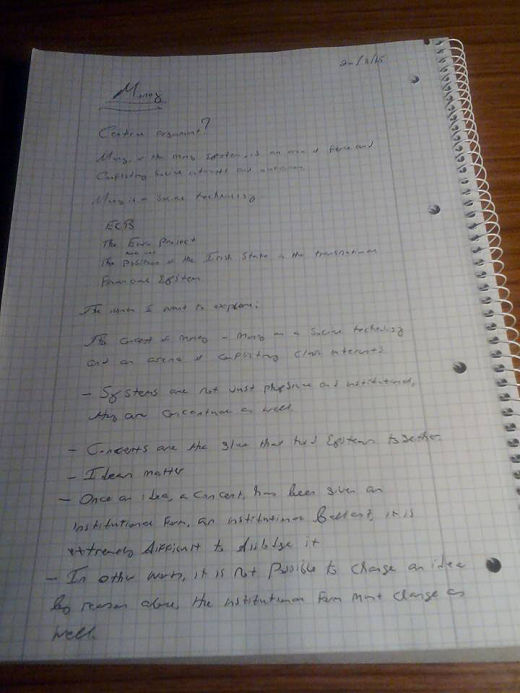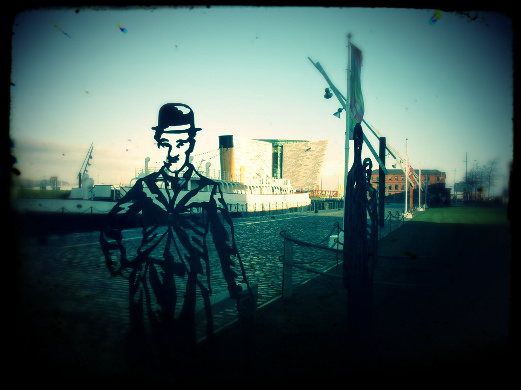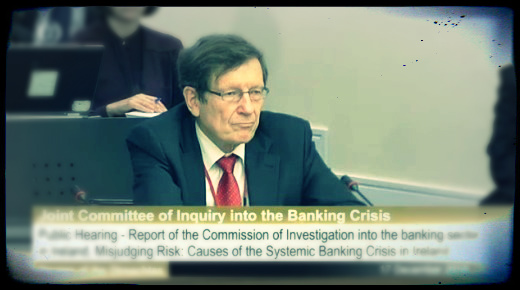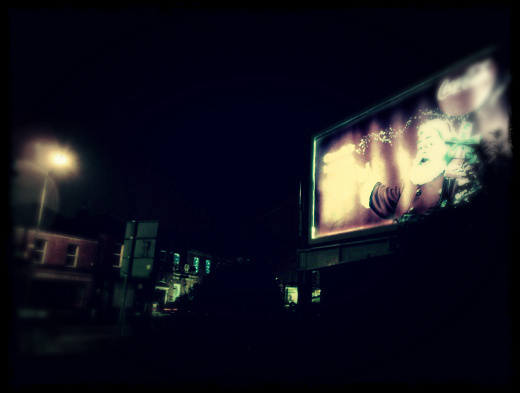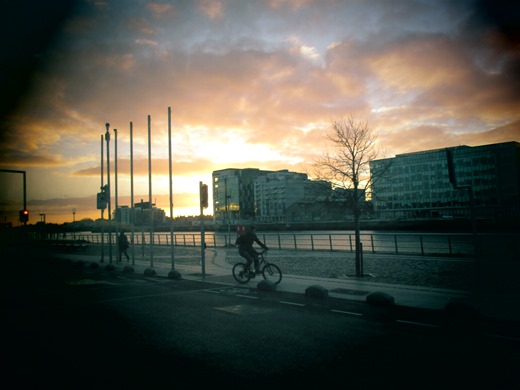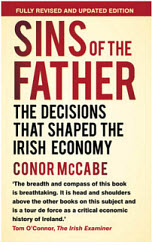
I
There is a lot more to class than accent or dialect. It is a power relation, the dynamics of which have shaped the contours of the Irish state since its establishment over 90 years ago in the courtyard of Dublin Castle. The economic interests of Ireland’s moneyed class have had an inordinate influence on our laws and on the scope and direction of government policies. They have been able to do this because their objectives and operational procedures are deeply embedded within the institutions of the state itself. They are without doubt the greatest block to progressive change in Ireland.
Take housing for example. It is no secret that we are in the midst of a housing crisis and the way to solve it is to build more houses. The problem is not the solution, which is refreshingly self-evident, but rather the question of whose economic interests should be served or side-lined by whatever plan is put in place.
Should we protect the financial interests of speculators and hope that they do the right thing, or should we protect ordinary households because we know that the former will only ever look after themselves?
The housing plans put forward by Fine Gael are designed in such a way as to ensure that the speculative price of a house will continue to rise. The government will try to help people ‘afford’ that price but it will not do anything to dampen, stall, or reverse its upward ascent.
The government says that property speculators need the right encouragements to build, and that the best incentive for them is a rising market. Meanwhile affordable accommodation is out of reach for ordinary households and this is compounded by official state policy.
The problem is that we are not just dealing with the relationship between property speculators and political parties: we are also talking about banks; land-hoarders; estate agents; insurance companies; the Department of Finance; the Central Bank; the Revenue Commissioners; tax lawyers; The Housing Agency; Real Estate Investment Trusts (Reits); the Department of the Taoiseach, and the Department of Housing and Local Government.
Housing is an industry. It comprises those involved in property speculation, financial and legal services, and the crafting of government policy. They have a shared economic interest and common cultural and intellectual reference-points, and these are not down to nor exclusively held by any one person or group.
These economic class interests have an institutional form: they are supported and maintained by the state apparatus and by the way the state operates. They are deeply embedded in our legal and taxation systems, both of which prioritise the interests of speculators and financiers over the common good. They are embedded throughout our banks as well as the regulators - as can be seen by the recent tracker mortgage scandal - and in the policy units of our government departments.
There has been in this state a forty-year move to shut down social housing and the class that has benefited from that will not allow any crisis for ordinary people to reverse that trend. In fact, the selling-off of our public housing stock, the almost complete privatisation of the rental sector, and the creation of the myth that home ownership ‘is in our DNA’ has been one of the great ideological successes of that class. They are not going to give that up for anyone.
And it is not just in housing that this class flexes its muscles. It is in workers rights as well.
On 28 September 2017 Regina Doherty, the Minister for Employment Affairs & Social Protection, appeared before the Joint Oireachtas Committee for Social Protection and proceeded to defend proposed new laws that would further erode the livelihoods of ordinary working people.
The minister said that she wanted to introduce measures to ban zero-hour contracts, but that she would also wanted to insert a caveat to ensure that ‘work of a casual nature’ was exempt from the legislation.
The minister was challenged on the idea of a law that would allow the continuation of the very thing it is supposed to ban, but Regina Doherty was not for turning. The law would stand as drafted, she said, before going on to criticise the Committee for being so negative.
Trade unions and civil society groups can lobby government and hope to influence the outcome, but in general Irish state departments will protect the interests of private business, with nothing but the weakest of concessions to fairness and social cohesion.
This leads us to the situation we have now: a minister who says she will ban zero-hour contracts - except in cases where bosses want to use them - and will force workers to apply for a work contract under terms that would give employers a fit of the giggles. This is coupled with a housing policy that is designed to benefit speculators and financiers over ordinary people.
We have been here before of course. The decision in 2008 to give an almost blanket guarantee to six banks in Ireland - despite the severe problems that were known in relation to at least two of them, Irish Nationwide Building Society and Anglo Irish Bank - was an exercise in genuine class power. It put certain vested interests over the well-being of the state. It was an unconscionable act that was not repeated by any other country within the Eurozone. As for the banks, however, it was nothing more than what their heightened sense of entitlement expected at the time.
Five days after the announcement of the Irish bank guarantee Sean Fitzpatrick, the chairman of Anglo Irish Bank, gave an address at the annual La Touche Legacy seminar in Greystones Co. Wicklow where he called for the ‘sacred cows’ of Irish society to be tackled once and for all. These were, in his opinion, universal child benefit, state pensions and medical cards for the over 70s. He also called for Ireland’s corporation tax rate to be cut to ten per cent.
The cost of guaranteeing Anglo Irish Bank would eventually come to around €30 billion, equal to just less than half of the bailout funds sourced from the Troika. The legacy debt of Anglo Irish Bank will be on the shoulders of the Irish people until 2054. It is certainly true that Ireland has sacred cows, and in 2008 they were the ones given a blanket guarantee to cover their disastrous investment plans while they waxed lyrical about child benefit and medical cards when the mood suited them.
‘Real elites only enter the day-to-day operations of government in periods of crisis’ wrote William K. Tabb in his seminal work on the 1970s New York fiscal crisis, ‘they move to the background as soon as possible, after they have restructured the context of decision-making in ways they find congenial.’ Ireland during the 2008 financial crisis was no different. There was a rupture in both the mechanisms and institutions that support economic class power in Ireland, and the political and economic strategy was to protect and rebuild those structures by whatever means necessary, regardless of the social cost. This was done via an unprecedented transfer of collective wealth from the citizenry to the banking system – a transfer that was only possible through State direction and control.
It showed us that, despite what we would like to think, class power matters. It is real, and it is ruthless.
But it is not enough to look at capitalism simply in terms of economic class alone, for if we do so we are in danger of missing out on the gendered nature of how capitalism works. Given the debate that that is out there at the moment – that somehow feminism and identity issues ‘distract’ from the struggle against capitalism – let me lay it out straight that nothing could be further from the truth. It is simply impossible to confront capitalism and not confront the exploitation of women through gendered roles and economic position in society. Impossible. And I don’t mean this as some kind of moral response on the part of progressives – that we should do it because it is ‘the right thing to do’. The struggle against the economic exploitation of women through gendered roles is a struggle against capitalism itself. That is a fact. Any progressive movement worth its salt ignores that at its peril.
By way of background, in the summer of 1972 a group of feminist activists from England, France, Italy and the US met in Padova, Italy and launched a new campaign based around wages for housework. ‘Class struggle and feminism for us are one and the same thing’ they said in a statement to the journal Off Our Backs. ‘We reject both class struggle as subordinate to feminism and feminism as subordinate to class struggle.’
The group identified itself as Marxist feminist and put forward a definition of class which incorporated the ‘exploitation of the labour of women in the home and the cause of their more intense exploitation out of it.’ The group said that ‘such an analysis of class presupposes a new area of struggle, the subversion not only of the factory and office but of the community.’
The group saw two equal and interdependent struggles in the two areas of production - the home and the factory – and said that it was wrong to assume that the women’s struggle was somehow secondary to that of class. ‘This assumption of the auxiliary nature of women’s struggle flows directly from the misconception that women’s labour in the home is auxiliary to the reproduction and development of capital’ they wrote, ‘a misconception which has so long hindered us all.’
This idea was expanded upon in a pamphlet co-written by Mariarosa Dalla Costa and Selma James published the same year entitled The Power of Women and the Subversion of the Community. ‘The community therefore is not an area of freedom and leisure auxiliary to the factory, where by chance there happen to be women who are degraded as the personal servants of men’, they said. ‘The community is the other half of capitalist organisation, the other area of hidden capitalist exploitation, the other, hidden, source of surplus labour.’
It was a continuation of a similar analysis put forward by the Canadian feminist activist, Peggy Morton, in her seminal 1970 article, Women’s Work is Never Done. Morton saw that in order to fully understand capitalism it was necessary to “see the family as a unit whose function is the maintenance of the reproduction of labour power,” and that “this conception of the family allows us to look at women’s public and private roles in an integrated way.”
A lot of left-wing thinking assumes a division of work into productive and unproductive sectors – with ‘factory’ productive and ‘household’ unproductive. This is a fundamental misconception, a blind spot to the manner by which capitalism operates. The household is the space where human labour is produced, maintained and reproduced, the cost of which is borne by the household.
Capitalism does not willingly pay for the reproduction of the labour it exploits. Social democracy forced it to contribute to this reproduction through legislation and general taxation, but from the 1970s onwards these very supports have been under profound attack, in particular by finance capital.
The slashing of corporation and capital taxes is the slashing of finance and industrial capital’s contribution to the social reproduction of human labour, pushing the burden back onto the shoulders of ordinary people. Austerity is a continuation of this process. It is class war writ large, with gendered consequences.
The drive to dismantle the welfare state in its various guises has had the effect of placing more pressure on women to compensate for the withdrawal of the state from this arena of social necessity. The absolute need for finance capital to devour the welfare state for profit-seeking purposes leaves finance capital open to attack. The issue contains the potential for a genuine counter-attack against finance capital. In the words of the London-based activist group, Feminist Fightback,
An alliance between working mothers and childcare workers has radical potential. It would require - and therefore constitute - a significant shift in mentalities, thereby pushing against one of the key divisions from which capitalism has benefited.
…This would not be an alliance to defend the current system, but to call for its transformation; for something better. Such alliances would also make visible the labour and economic impact of care work, confronting the logic at the heart of the government’s representation of public services as a luxury extra.’
Such strategies shine a light on the patriarchal nature of capitalism. They show that both class and gender are crucial to understanding how actually-existing capitalism works, and are crucial to any plan to oppose it.
II
Right2Change needs to embrace all these three elements discussed - class, gender, and labour – in a commonwealth of civil society groups and trade unions.
We need to do this in order to shape our own future. The alternative to the current situation of seeing the interests of Ireland’s moneyed classes made law is quite straightforward: we make the laws ourselves. And in order to do that, we need to organise.
Class power and class interests cannot be tackled at an individual level. The only thing that can take on deeply-embedded class interests is a counter-class organisation. In other words, if we want to take on those who are organised at a class and state level then we need to do the same – we also need to organise at a class level with the aim of shaping the direction of the state in a progressive way.
But again whereas the solution is somewhat straightforward, the pathway to it is fraught with tensions, contradictions and compromises.
Societies are never static. It is simply impossible for them to be so for it has too many millions of moving parts. society is in a constant state of development: it is an ongoing process.
Institutions, however, are a different matter. Once a class interest takes an institutional form it is very difficult to dislodge it. The issue that confronts us today is not so much societal but institutional change.
We want the state to be reflective of where we have already arrived in our thinking. The question is how do we harness the change that is happening and give it an institutional expression? How do we replace the old conservatism and embedded financial interests with the new in terms of social solidarity, and how do we do it without making things worse?
Right2Change produced a document before the last election in 2016 that outlined what it saw as essential policies of a progressive state. These included a right to housing, health, and education; to democratic reform; to equality and a sustainable environment; and to the public ownership of natural resources including water.
All of this requires organisation. It also needs a plan. Without a workable method of implementation any vision put forward of a progressive and equal Ireland is merely an aspiration. It is a set of words that serves no threat to power and its institutions.
The desire to make the world a better place, though, is not enough to make it happen, no matter how worthy the shopping list of reforms. It never has and it never will be. Progressives have no choice but to organise on class lines, because that is exactly what Irish moneyed interests have done. They have the state to protect those interests, so progressives need an organisational framework that is able to confront those interests and overcome the blocks to change they have put in our path. In order to have any chance of success, progressives need a different organisational dynamic to that of Right2Water, the campaign that formed the basis for Right2Change.
Right2Water was not about a new vision for Ireland; it was about stopping the government and the Irish moneyed class from putting in place their economic plan for a public utility. Right2Water was able to do that because the mechanisms that utility needed in order to work as a private, profit-seeking company were not in place at the time the protest began.
The utility, which became Irish Water, needed a separate and clearly identifiable income stream via charges in order to attract private investment and remain listed as a private entity for government statistical purposes. This was fatally undermined by the payment boycott. The company’s funding model assumed a 90 percent compliance rate by private households; by the end of 2015 it stood at 30 percent.
The payment boycott worked because of the dozens of community-based organisations that sprang up to resist the installation of water meters and charges in general. The massive rallies that followed gave national expression to that local energy. The message that was sent out on Facebook and Twitter countered the media bias. People could see the resistance with their own eyes. They stopped believing RTE; they stopped believing the Irish Times. The class interests of Irish society were there for all to see.
Right2Water was reactive, in a positive way. It was an act of resistance, and a successful one at that. The task that faces Right2Change is to build a transformative movement out of a reactive campaign. This is not an easy thing to do. I do not see, though, how we have much choice. As the old saying goes, when life gives you lemons, organise.
III
No plan survives contact with reality. The more intricate the design, the more likely it will fail. To coin an old phrase, ‘Men plan and God laughs’. The strategies that work are the ones that leave room for creativity and spontaneity. They have to do this, for the world has a way of throwing curve balls that knock you over when you least expect.
This means that a progressive movement cannot simply follow a plan as if life is some sort of predetermined pathway. No. A progressive movement needs: a set of objectives; an organisational structure to harness the societal energy that is out there for progressive change; a plan on how to achieve those objectives; and crucially the ability to think and rethink the plan while it is in operation. The objectives stay the same, the flexibility is in the methods we adopt to get there.
We need an organisational structure that is robust enough to make our objectives real, flexible enough to allow us to achieve them, and reflective enough of the particular and specific class antagonisms and gendered exploitation that are at play in this state to allow us to confront the class that opposes us.
No small ask, and, unfortunately, one that cannot be googled. There is no Wikipedia page out there on how to build a progressive movement specific to the societal needs and class dynamics of Irish society. (No need to check, I already have.)
This is one thing we are going to have to work out for ourselves. We are going to have to teach ourselves to think about how Ireland works. We need to develop these skills so we can adapt our strategies ourselves as circumstances arise.
The skill of thought and reflection is often labelled as education, but it has little if anything to do with school or experts. Activist education, done properly, does not teach you how Ireland works, it teaches you to think about how Ireland works. And it does that for a very specific and practical reason: activists are on the ground and they need to be able to adapt strategies when the need arises – that means they need to be able to think clearly about how to achieve the same objectives but by different means.
The Right2Water campaign threw up dozens of examples of this such as the various ways of blocking water meters, the use of social media as an organisational tool, and the ’silent women’ protest in Coolock.
When we talk about education we are talking about a way of harnessing this experience and creativity, and placing it within a conceptual framework of economic class power and how it operates in Ireland today. Education used in this way simply gives direction and focus to what is already there. Education is not knowledge; it is understanding. It is not passive; it is active. Education is a tool that builds a deeper understanding of class as a power relation by using the knowledge and experience of activists on the ground. A movement that is able to think for itself – genuinely think for itself – is genuinely transformative.
In conclusion, in order to tackle Irish moneyed class interests we need a commonwealth of civil society and trade unions working in tandem with a progressive political sphere. It’s about education, campaigns, legislation, and resources, all framed by class consciousness - that is, an awareness and understanding of how class works in Ireland, its economic and gendered necessities, and the organisational solidarity needed to tackle it.
It is entirely achievable.
